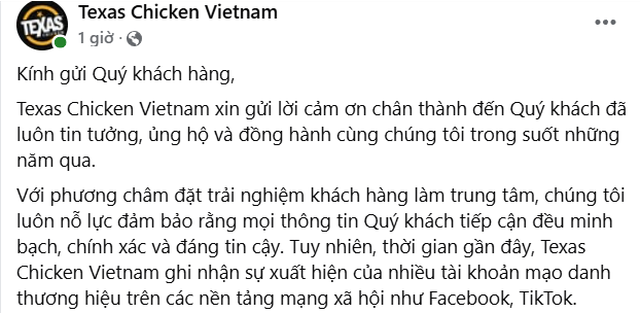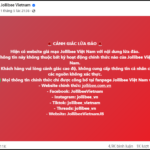Just hours after KFC Vietnam issued a warning about trademark impersonation on social media platforms, Jollibee Vietnam and Texas Chicken Vietnam followed suit.
On the morning of May 10, Texas Chicken Vietnam, an American fried chicken brand, posted on their official fanpage, warning about the recent emergence of numerous imposter accounts on social media platforms such as Facebook and TikTok.
These fake channels not only illegally use the brand’s logo, images, and name but also have the potential to distort information, affecting customers’ choices and experiences.
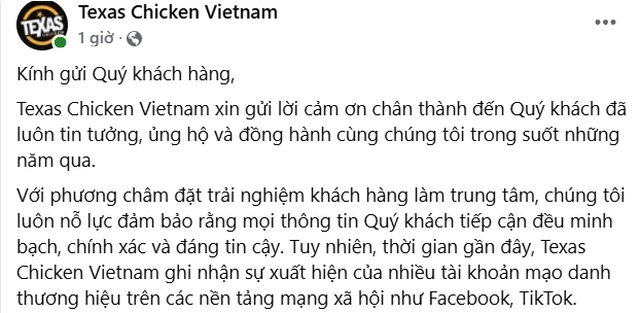
Texas Chicken Vietnam warns about the presence of numerous imposter accounts on social media
The brand cautions that any content not originating from their official system does not represent the brand’s voice and may pose risks to users.
Texas Chicken entered the Vietnamese market in late 2012 and currently has 30 restaurants in Ho Chi Minh City, Binh Duong, Nha Trang, Hanoi, Hai Phong, and Bien Hoa.
On the same day, the Jollibee Vietnam fast-food chain also issued a warning about numerous imposter accounts using their brand on social media, especially TikTok.
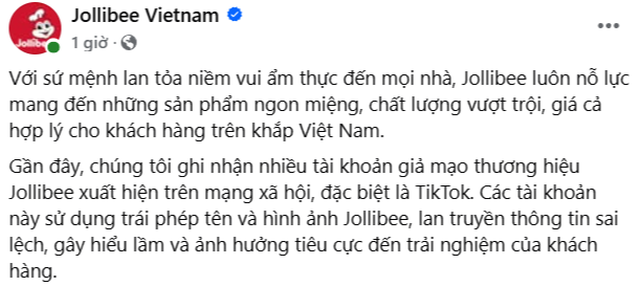
Jollibee Vietnam also warns about imposter accounts on social media
These accounts illegally use Jollibee’s name and images, spreading misleading and negative information that affects customers’ experiences.
Earlier, on May 9, KFC Vietnam also announced that they had detected numerous cases of trademark impersonation, including their restaurant branches, on social media platforms, especially Facebook and TikTok.
Misleading content, messages, and images are being widely spread, causing serious misunderstandings about the brand.
To protect consumers, all three fried chicken brands have included official social media links in their announcements.
According to observations, numerous imposter accounts of Texas Chicken Vietnam, Jollibee, and KFC Vietnam have emerged on social media platforms such as TikTok and Facebook.
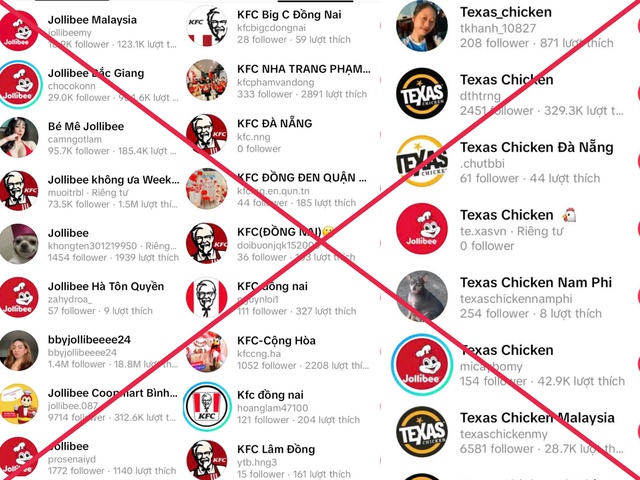
Numerous fake channels on social media
These accounts use similar names and logos to comment on various videos, making controversial and offensive statements and causing misunderstandings.
From a legal perspective, Lawyer Truong Van Tuan, Head of Trang Sai Gon Law Office, stated that according to Article 12 of the Law on Information Technology 2006, the following acts are prohibited: “Distorting, slandering, and offending the prestige of organizations, honor, dignity, and prestige of citizens.”
As such, these acts can be considered prohibited and illegal as they impersonate the electronic information pages of organizations and individuals.
According to Clause 3, Article 99 of Decree 15/2020/ND-CP, amended by Clause 1, Article 1 of Decree 14/2022/ND-CP of the Government, stipulating the sanction of administrative violations in the field of post, telecommunications, radio frequency, information technology, and electronic transactions, the act of impersonating electronic information pages, providing false information, distorting, slandering, and offending the prestige of organizations and honor and dignity of individuals can be fined up to VND 30 million.
Additionally, the violators may also have their means of violation confiscated and be forced to take remedial measures by removing all misleading and false information.
More severely, this act may also be subject to criminal prosecution under Article 155 of the 2015 Criminal Code, which defines the “crime of insulting others.”
Specifically, if the competent authorities determine that the act of establishing imposter channels on Facebook and TikTok platforms and then making distorted statements or comparing competitors has seriously insulted the honor and dignity of others, the violators may be criminally liable for the crime of “Insulting Others.”
For this offense, the maximum prison sentence is five years, along with possible additional penalties such as a ban on holding certain positions or practicing certain professions for one to five years.
“To avoid penalties and criminal liability, people should refrain from creating imposter channels of individuals or organizations for any purpose,” advised Mr. Tuan.


























